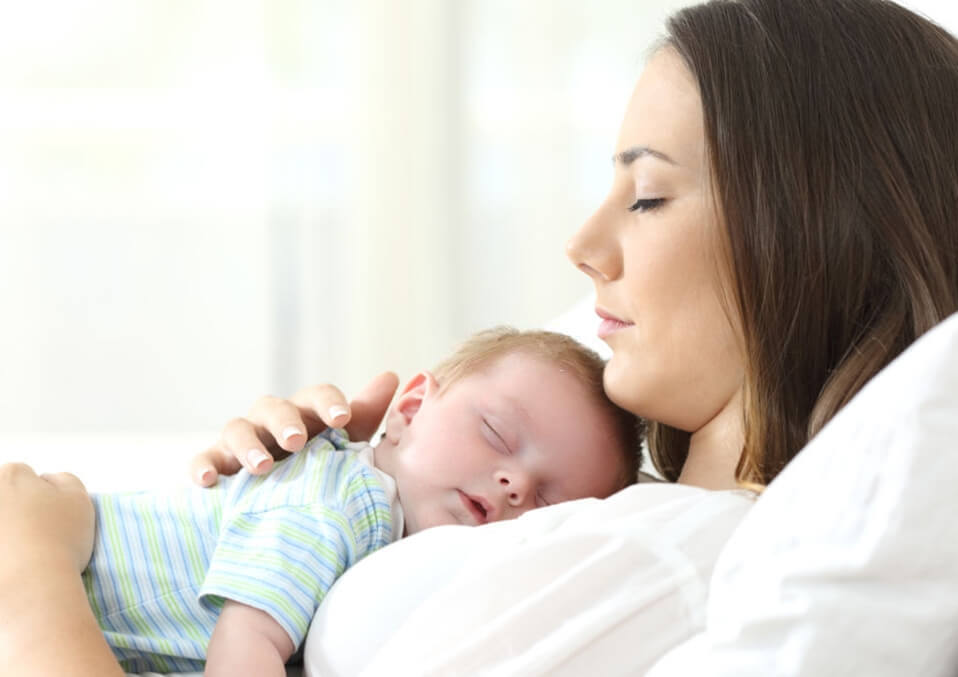No matter how much you look forward to having a child and you love your child so much, having a baby is very stressful. You have to deal with sleep deprivation, new responsibilities, and you find yourself having no time for taking care of yourself. It’s no surprise that new moms feel like they are on an emotional rollercoaster. Actually, mood swings and mild depression are very common in new moms and it has its own name which is the “baby blues”.
Most of the new moms experience at least some of the symptoms of baby blues right after they gave birth. It is caused by the sudden change in your hormones, stress, sleep deprivation, isolation, and fatigue as well. Moms may feel more overwhelmed, tearful, and mostly emotionally weak. In general, baby blues symptoms can start within the first couple of days, it will peak in one week, and will go down by the end of the second week. Moms should not be overly worried about baby blues because it is perfectly normal. But if the symptoms don’t go away after a few weeks or it even gets worse, you may be already suffering from postpartum depression.
Unlike baby blues, postpartum depression is a serious problem that you should not ignore. Postpartum depression can look like the normal baby blues at first. Actually, baby blues and postpartum depression have many similar symptoms, that includes mood swings, sadness, insomnia, crying, and irritability. The difference with postpartum depression is that the symptoms are more intense and last longer. Moms might not be able to bond well with their babies and withdraw from their partners. They may find their anxiety is going out of hand and even disturbs their sleep even when the baby is sleeping and eating well. They may feel guilty and worthless feelings and even think about suicide. These are red flags for postpartum depression.
Why do some new moms develop postpartum depression?

Actually, there is no definite single reason why some new develop postpartum depression while others don’t. But there are some related causes and risk factors that are believed to contribute to this. Here are some of it.
Hormonal changes
After giving birth, there is a big drop in estrogen and progesterone hormone levels in mothers. Thyroid levels can also drop which can cause fatigue and depression. The sudden hormonal changes along with blood pressure, metabolism, and immune system functioning may trigger postpartum depression for new mothers.
Stress
Caring for a newborn baby is stressful. New mothers often have a lack of sleep. You can also feel overwhelmed with how to properly care for a newborn baby. These adjustments can be hard for new moms and the stress can trigger postpartum depression.
Other risk factors

Other risk factors include non-pregnancy depression or a family history of depression. It can also include a lack of emotional support, an abusive relationship, and financial uncertainty. It can also be because of the sudden discontinue of medications for pregnancy purposes.
Helpful tips to overcome postpartum recovery problems:
Create a secure attachment with your baby
A secure attachment can be formed when mothers respond warmly and consistently to the physical and emotional needs of her baby. When the baby cries, immediately soothe her or him. Respond kindly when your baby smiles and laughs. In that way, you are responding to each other’s emotional and physical signals. This can create a bond and attachment with your baby that can help with postpartum depression or other recovery problems.
Lean on others for help and support

We are naturally social. Positive social contacts can relieve your stress and can help with your stress reduction. Sometimes, new moms find themselves alone, lonely and exhausted. They need supportive adults like family and friends around them to help them. When mothers feel depressed, they should stay connected with their family and friends. You should let your loved ones know what you need and how you would like to be supported as well. Don’t keep your feelings to yourself. You can chare what you are experiencing to at least one person you can rely on.
Take care of yourself
Taking care of yourself is one of the best things you can do to avoid or relieve postpartum recovery problems or depression. Simple ways of taking care of your mental and physical health are important. You can ease back on exercise, sleep more, make meals as a priority, get some sunshine, and set aside time for yourself like getting a massage. These simple ways can slowly but surely help you recover from postpartum depression or problems.
Postpartum depression is a serious matter and should not be ignored by mothers, partners, and family. There are many ways you can avoid or relieve this and it will surely help you cope up. We hope that this article helped new moms cope up with the challenges and changes due to motherhood. May your sacrifices be filled with joys and happiness later on.
Read also:
- 9 Practical Tips on How to Help New Parents
- What are the Best Things to do for a New Mom?
- How Becoming a Mother Changed a Woman’s Life?


